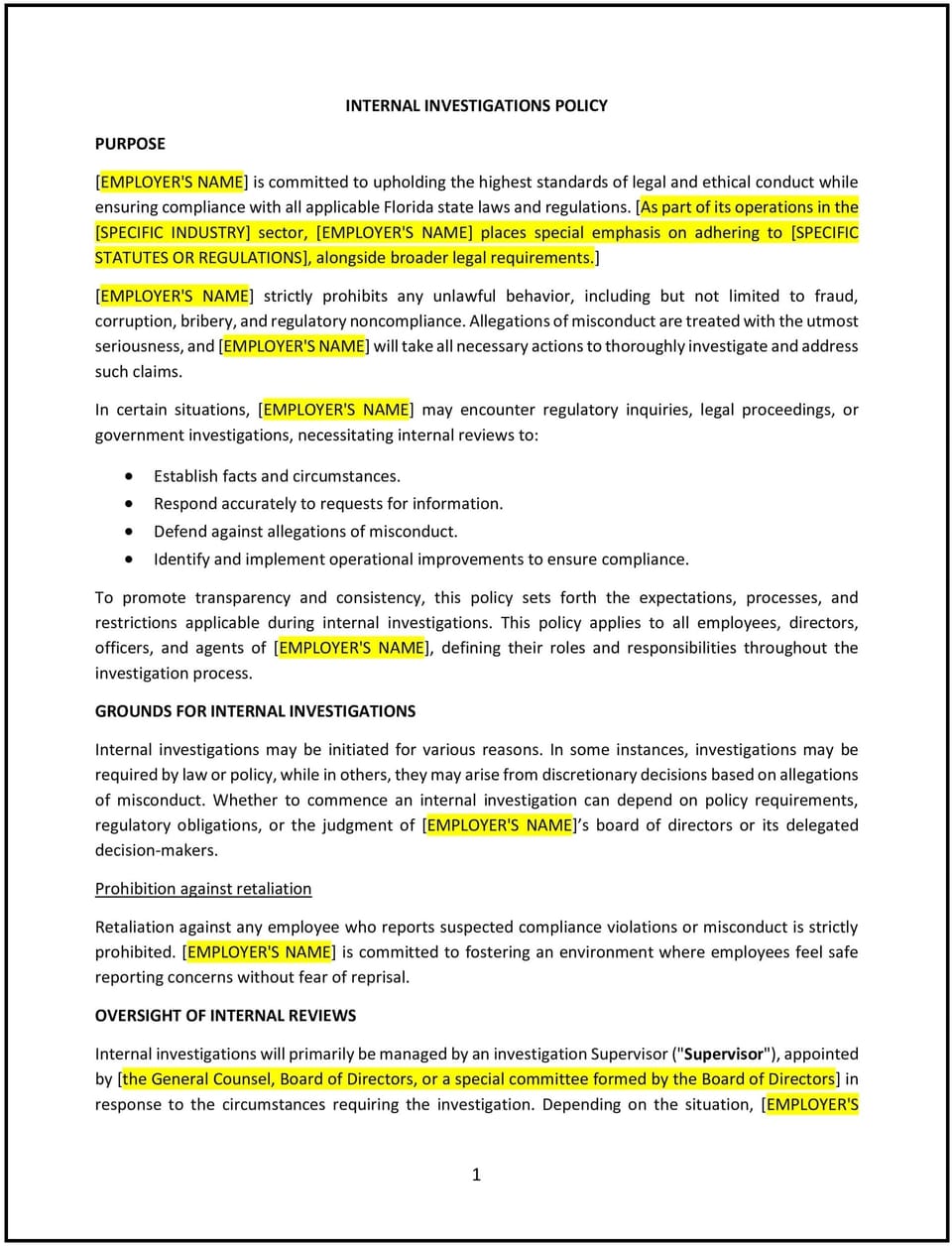Internal investigations policy (Florida): Free template

Internal investigations policy (Florida)
An internal investigations policy helps Florida businesses establish a structured approach for addressing workplace concerns, allegations, or misconduct. This policy outlines procedures for conducting fair, thorough, and consistent investigations while protecting the rights of all parties involved. It is designed to promote transparency, reduce risks, and provide clear guidelines for resolving issues in a timely and professional manner.
By implementing this policy, businesses in Florida can demonstrate their commitment to accountability, foster trust among employees, and align with the state’s focus on ethical and responsible workplace practices.
How to use this internal investigations policy (Florida)
- Define investigation scope: Clearly specify the types of issues that warrant an internal investigation, such as harassment, discrimination, theft, or policy violations.
- Establish reporting procedures: Outline how employees should report concerns, including whom to contact and whether anonymous reporting is available.
- Address investigation protocols: Explain how investigations will be conducted, including gathering evidence, interviewing witnesses, and documenting findings.
- Provide confidentiality: Specify how the business will protect the privacy of individuals involved while ensuring transparency in the process.
- Communicate outcomes: Outline how findings and corrective actions will be communicated to relevant parties while maintaining fairness and consistency.
- Train investigators: Educate designated personnel on conducting impartial and thorough investigations in accordance with the policy.
- Monitor adherence: Regularly review investigation processes and address any concerns or discrepancies promptly.
- Update the policy: Periodically assess the policy to reflect changes in workplace dynamics, legal standards, or business needs.
Benefits of using this internal investigations policy (Florida)
This policy offers several advantages for Florida businesses:
- Promotes fairness: Clear guidelines help ensure investigations are conducted consistently and without bias.
- Reduces risks: Defined procedures minimize the likelihood of unresolved issues escalating into legal disputes or reputational damage.
- Builds trust: A transparent process demonstrates the business’s commitment to accountability and ethical practices.
- Aligns with community values: Reflects Florida’s emphasis on fairness, integrity, and mutual respect in the workplace.
- Enhances reputation: A robust policy showcases the business’s dedication to resolving concerns responsibly and professionally.
- Improves decision-making: Helps businesses make informed decisions based on thorough and documented findings.
- Supports growth: A strong framework for investigations fosters a culture of accountability and continuous improvement.
Tips for using this internal investigations policy (Florida)
- Communicate clearly: Ensure employees understand the policy by providing written materials and discussing it during meetings or training sessions.
- Train managers: Educate supervisors on recognizing when to initiate investigations and how to handle reports of misconduct appropriately.
- Be impartial: Ensure investigations are conducted objectively, without favoritism or bias, to maintain credibility and fairness.
- Stay organized: Maintain detailed records of investigations, including evidence, interviews, and outcomes, to ensure transparency and accountability.
- Encourage feedback: Solicit input from employees to identify areas for improvement and ensure the policy meets their needs.
- Review periodically: Assess the policy’s effectiveness and make updates as needed to reflect changes in workplace dynamics or business goals.
Q: Why should Florida businesses adopt an internal investigations policy?
A: Businesses should adopt this policy to promote fairness, reduce risks, and demonstrate their commitment to resolving workplace concerns responsibly.
Q: What types of issues should trigger an internal investigation?
A: Businesses should consider investigating allegations such as harassment, discrimination, theft, policy violations, or other forms of misconduct that impact the workplace.
Q: How should businesses handle anonymous reports?
A: Businesses should take anonymous reports seriously, investigate them thoroughly, and ensure confidentiality to protect the reporter’s identity.
Q: Who should conduct internal investigations?
A: Businesses should designate trained personnel, such as HR professionals or external consultants, to conduct investigations impartially and professionally.
Q: What should businesses do if an investigation reveals misconduct?
A: Businesses should take appropriate corrective actions, such as disciplinary measures, policy updates, or additional training, to address the issue and prevent recurrence.
Q: Should businesses document investigation outcomes?
A: Businesses should maintain detailed records of investigation findings and outcomes to ensure accountability and provide a reference for future cases.
Q: How often should businesses review the policy?
A: Businesses should review the policy annually or whenever there are significant changes in workplace dynamics, legal standards, or business operations.
This article contains general legal information and does not contain legal advice. Cobrief is not a law firm or a substitute for an attorney or law firm. The law is complex and changes often. For legal advice, please ask a lawyer.


